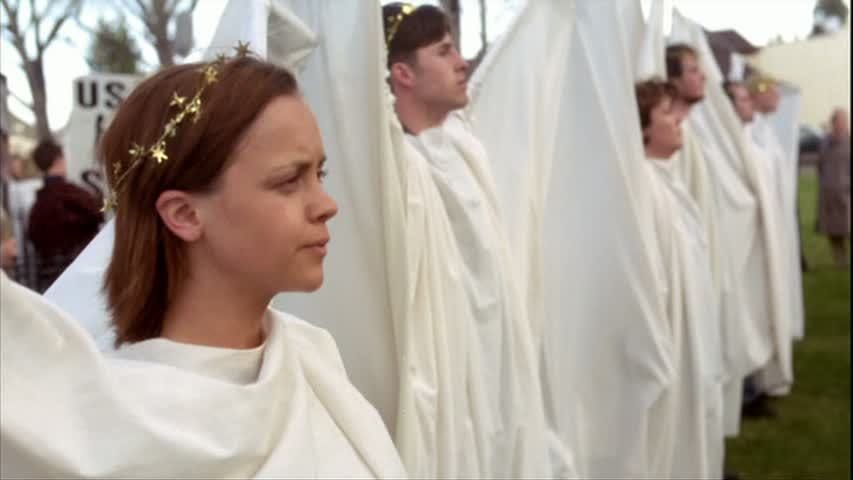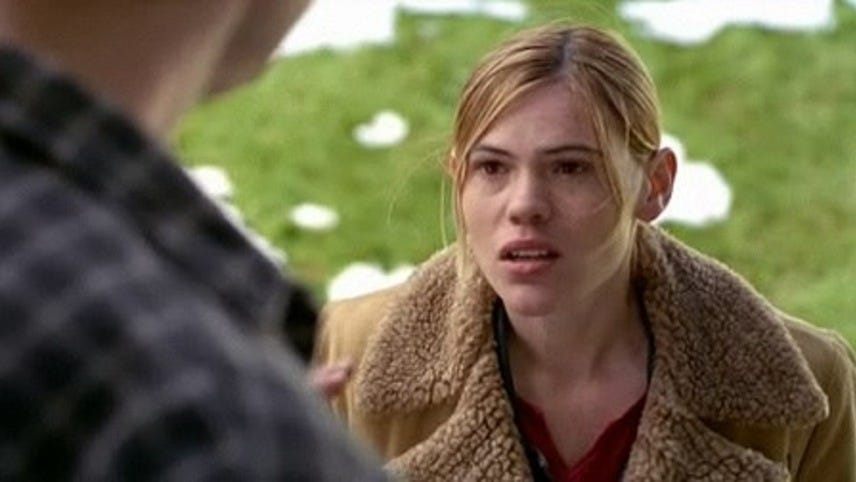Written and Directed: Moisés Kaufman
No, it isn't strictly a lesbian movie. The Laramie Project is a queer film, and once again it took HBO to bring this amazing story to the screen. It affects us all, and should have the effect of reminding us that we are all in this fight together. It is also a film that allows us to reflect, not only about the victims of hate crimes, but about the violence that gets committed against the LGBT community every day in the form of evil words and unjust laws that remove (or simply don't protect) our basic human rights.
When Matthew Shepherd, a 21 year-old gay man, was beaten to death and left to die tied to a fence in Laramie, Wyoming, it sparked anger across the world. Gays and lesbians everywhere faced their worst fear; of being physically attacked for just being themselves. Here was evidence that this kind of evil exists.
Of course, it also made the entire world understand that killers like this can be bred anywhere, and they are. In the words of Melissa Etheridge:
We all gasp this can't happen here
We're all much too civilized
Where can these monsters hide
But they are knocking on our front door
They're rocking in our cradles
They're preaching in our churches
And eating at our tables.
(Scarecrow)
That, more than anything, makes this film more horrifying than any horror film.
The premise, which comes across as a pseudo-documentary, is to trace the experience of a group of young people from the Tectonic Theatre Company who came to Laramie six times in the year after Matthew Shepherd's death in order to interview the townspeople about how they felt about the tragedy and to write a play about it.
Neither the play nor the film is about Matthew Shepherd himself, it's about the people who knew him, the people who were most affected by his death. The play is based on actual transcripts from the interviews, and the film script resembles the stage version pretty closely.
What results is a fascinating mixture between documentary, theatre and narrative film. The story is how so much can change, and yet how so little has changed. Certainly the lives of the people involved were changed irrevocably, but as the film points out, Matthew Shepherd's death did little to actually change the laws against hate crime and discrimination in the US or anywhere else.
What fascinated me was that the theatre troupe became as much a part of the story as Matthew Shepherd and his family and friends. They are our eyes and ears, dragging us into this horror. Three of them are gay, and they express their fear at asking these questions in such a place. They asked themselves if they weren't putting themselves in danger. What would stop some other gay-hater from dragging them off, pistol whipping them and hanging them from a fence?
I'm torn between whether the high-calibre stunt casting actually helped or hurt the film. After a while I stopped being surprised each time. Some atrociously overact (Laura Linney, Joshua Jackson) but others were spot on. Christina Ricci as Matthew's best friend was the most touching. Her big eyes flooded with emotion in every scene, and we feel her loss acutely. Most of the time, because the words coming out of their mouths were of ordinary people, we could almost forget about the casting. Almost.
The film was directed and written by Moisés Kaufman who was among the original theatre troupe (and one of the out gay men) who asked the original questions. Clea DuVall as Amanda, another of the original five, is just so real. Her scene standing in the snow as she asks the conservative Reverend how he feels about Matthew Shepherd's death is haunting. Afterwards she berates herself - how could she let him say those things to her and just say nothing? How could she let him get away with that? Sadly, all over the world every day people get away with the same veiled hatred in the guise of free speech.
In the end it's better to hear the dissident voices than to have them gagged, even if they are preaching hate. At least then we know who they are. I don't think I have ever really thought about the expression "live and let live" before seeing this film. Now every time I hear it I will shudder, because just as one character says, in reality it is sometimes just shorthand for "keep quiet and I'll have no reason to hurt you".
I expect the film to spark a lot of emotion. I cried like I haven't cried in a long time, and my heart will ache every time I think of this film for the rest of my life. I have these images in my mind of the stock footage of Ellen Degeneres saying to a gathering of people, tears in her eyes, "This is what I've tried my whole life to prevent." Of Bill Clinton begging his country to reject violence against those who are different. Of the Laramie townspeople who dressed up as angels and floated through the town, as a silent vigil for the dead and as the strongest of all rebuttals against preachers of hate.





